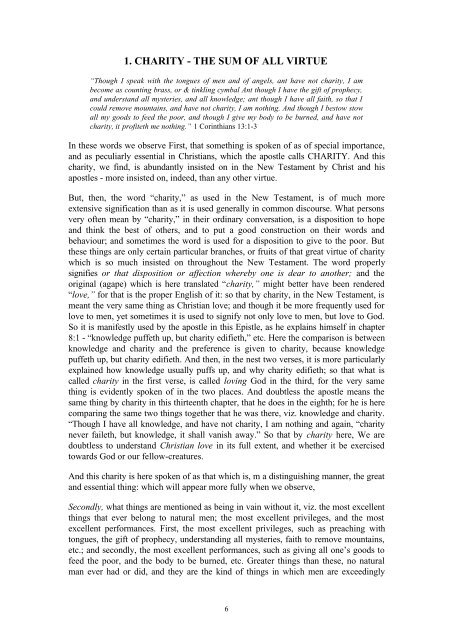CHARITY AND IT'S FRUITS BY JONATHAN EDWARDS
Few Christian leaders since the Reformation have been as gifted as Jonathan Edwards. A man of intense personal devotion to Christ, he was a leader of revival, and a creative Reformed theologian as well as A Missionary. Charity and Its Fruits gives us an insight into Edward's regular pulpit ministry in the years between the Northampton revival of 1735 and 'the Great Awakening' of 1740.
Few Christian leaders since the Reformation have been as gifted as Jonathan Edwards. A man of intense personal devotion to Christ, he was a leader of revival, and a creative Reformed theologian as well as A Missionary. Charity and Its Fruits gives us an insight into Edward's regular pulpit ministry in the years between the Northampton revival of 1735 and 'the Great Awakening' of 1740.
Create successful ePaper yourself
Turn your PDF publications into a flip-book with our unique Google optimized e-Paper software.
1. <strong>CHARITY</strong> - THE SUM OF ALL VIRTUE<br />
“Though I speak with the tongues of men and of angels, ant have not charity, I am<br />
become as counting brass, or & tinkling cymbal Ant though I have the gift of prophecy,<br />
and understand all mysteries, and all knowledge; ant though I have all faith, so that I<br />
could remove mountains, and have not charity, I am nothing. And though I bestow stow<br />
all my goods to feed the poor, and though I give my body to be burned, and have not<br />
charity, it profiteth me nothing.” 1 Corinthians 13:13<br />
In these words we observe First, that something is spoken of as of special importance,<br />
and as peculiarly essential in Christians, which the apostle calls <strong>CHARITY</strong>. And this<br />
charity, we find, is abundantly insisted on in the New Testament by Christ and his<br />
apostles - more insisted on, indeed, than any other virtue.<br />
But, then, the word “charity,” as used in the New Testament, is of much more<br />
extensive signification than as it is used generally in common discourse. What persons<br />
very often mean by “charity,” in their ordinary conversation, is a disposition to hope<br />
and think the best of others, and to put a good construction on their words and<br />
behaviour; and sometimes the word is used for a disposition to give to the poor. But<br />
these things are only certain particular branches, or fruits of that great virtue of charity<br />
which is so much insisted on throughout the New Testament. The word properly<br />
signifies or that disposition or affection whereby one is dear to another; and the<br />
original (agape) which is here translated “charity,” might better have been rendered<br />
“love,” for that is the proper English of it: so that by charity, in the New Testament, is<br />
meant the very same thing as Christian love; and though it be more frequently used for<br />
love to men, yet sometimes it is used to signify not only love to men, but love to God.<br />
So it is manifestly used by the apostle in this Epistle, as he explains himself in chapter<br />
8:1 - “knowledge puffeth up, but charity edifieth,” etc. Here the comparison is between<br />
knowledge and charity and the preference is given to charity, because knowledge<br />
puffeth up, but charity edifieth. And then, in the nest two verses, it is more particularly<br />
explained how knowledge usually puffs up, and why charity edifieth; so that what is<br />
called charity in the first verse, is called loving God in the third, for the very same<br />
thing is evidently spoken of in the two places. And doubtless the apostle means the<br />
same thing by charity in this thirteenth chapter, that he does in the eighth; for he is here<br />
comparing the same two things together that he was there, viz. knowledge and charity.<br />
“Though I have all knowledge, and have not charity, I am nothing and again, “charity<br />
never faileth, but knowledge, it shall vanish away.” So that by charity here, We are<br />
doubtless to understand Christian love in its full extent, and whether it be exercised<br />
towards God or our fellow-creatures.<br />
And this charity is here spoken of as that which is, m a distinguishing manner, the great<br />
and essential thing: which will appear more fully when we observe,<br />
Secondly, what things are mentioned as being in vain without it, viz. the most excellent<br />
things that ever belong to natural men; the most excellent privileges, and the most<br />
excellent performances. First, the most excellent privileges, such as preaching with<br />
tongues, the gift of prophecy, understanding all mysteries, faith to remove mountains,<br />
etc.; and secondly, the most excellent performances, such as giving all one’s goods to<br />
feed the poor, and the body to be burned, etc. Greater things than these, no natural<br />
man ever had or did, and they are the kind of things in which men are exceedingly<br />
6

















